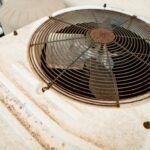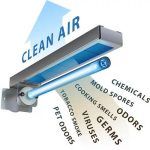
Air Conditioner Smells Air conditioning systems eliminate moisture from living space and filter air pollutants before they can get indoors. However, if you don’t schedule routine maintenance or clean your air conditioning unit frequently, it can cause your indoor air to become stinky. If your AC unit emits a foul odor, there could be several issues at play. Here are some reasons why your air conditioner smells and how to alleviate the problem in your home. 1. Frozen Evaporator Coils An air conditioning unit works by absorbing the warm air inside your house, removing moisture from it, and cooling it down before cycling it back into the house via the return vents. Good airflow is essential for the entire process, which means your unit should have clean air filters. Debris, dirt, and other pollutants usually block airflow through air filters, forcing the water drops from moist indoor air to accumulate on the coils. The water collecting on the unit’s evaporator coils will then freeze as the refrigerant cools down the air. That is where the significance of changing filters at home is realized. Replace or clean your filters more regularly to prevent the evaporator coils from freezing and emitting unpleasant...
View Article

How Do UV Light Indoor Air Quality Products Work? Over the past year, we’ve seen a renewed interest in natural environmental disinfection products. And many homeowners are just learning about UV disinfection technology for the first time. UV disinfection has a long, well-proven history, beginning with water treatment science, dating back to the late 1870s when the disinfectant properties of sunlight were first discovered. Today, UV light is not only a widely accepted treatment for the removal of water contaminants. It has become a powerful tool in disinfecting your home’s entire living environment. Why Consider a UV Light Indoor Air Product? We at in St. Louis have are completely aware of how vital it is to protect the air quality of your home, which is why we think it’s important you understand the benefits of a non-invasively installed germicidal UV light product to your central air system. A well-functioning air system is essential to keeping your house cool in the summer and warm in the winter. But because the system is constantly recirculating oxygen in your home, it can spread unhealthy airborne contaminants throughout your dwelling. It can send viruses, bacteria, mold, and allergens like pollen into every room. And...
View Article

What Are Indoor Air Quality Monitors? As health issues become more important for families, many St. Louis homeowners are looking for ways to improve air quality inside their homes. Indoor air quality has been linked to many health issues, such as allergies and respiratory illnesses. Families with young children, elderly, or immune-compromised people are especially concerned because airborne irritants increase the chances of worsening or causing chronic medical problems. At , we work with St. Louis homeowners to find affordable and effective ways to improve indoor air quality. The first step is to know if you have an indoor air quality problem, and an air quality monitor is an excellent investment. 1. What is an Air Quality Monitor? Air quality monitors are designed to detect harmful airborne particles within a specific area based on square footage. You can have a monitor for only certain parts of your home, such as bedrooms and living spaces, or you can find whole-home air quality monitors. We recommend whole-home monitors for households with children, the elderly, and people with chronic health conditions. You may also want a whole-home model if you are concerned with viruses, bacteria, and mold spores. 2. How Do Air Quality...
View Article

How Often Should You Get HVAC Maintenance? A well-maintained HVAC system could leave homeowners with fewer worries and concerns. Who wants a furnace to break down on one of the coldest days of the year, or any day for that matter? Thankfully, routine HVAC maintenance could deliver reliable assistance that keeps a heater operating smoothly. Sometimes, a thorough inspection picks up on a minor problem that could turn into a significant disaster. Catching these issues in time might save homeowners from aggravation and repair costs. How often should routine maintenance and inspections occur? Here are some things to keep in mind. Making Plans for Routine Maintenance Generally, an annual service visit could be adequate for many homes and their accompanying systems. Some sources may suggest a visit once every two years is fine, but once a year might make more sense for some homeowners. Suggestions for routine maintenance checks once every two years come with a caveat. A property located in a mild climate with consistent weather throughout the year may not deal with scorching summers and freezing winters. Therefore, the system might not go through extensive use. Annual inspections become critical in other regions where there are concerns about...
View Article
Do Humidifiers Work in the Winter? Have you noticed that your family’s complaints about their physical comfort increase in the winter? If the air inside your home gets too dry, the body gets dried out, too. The skin, eyes, nose, and mouth can become itchy and very uncomfortable. Your heater may be keeping you warm indoors, but you may still be terribly uncomfortable. Balancing the moisture inside your house can enhance the quality of life you live. A humidifier or humidifying system can increase the moisture in your indoor air. Even when you live in a humid climate, a humidifier may be required during the winter. This is because modern heating systems dry out the air in a dramatic way, regardless of the humidity outdoors. Installing a modern humidifier is an important solution to consider when improving the quality of the indoor air you breathe. Moisture Levels Support Good Health The level of humidity in the air identifies the amount of moisture or water vapor present. When there’s too much humidity, you can feel sluggish and uncomfortable. Too little humidity can cause the body to get dried out and itchy, and dehydration can be enhanced. The right level of humidity...
View Article
The Benefits and Limitations of Heat Pump Use in Winter Manufacturers build reversible mechanical systems within heat pumps so that they can provide either heated or cooled air. The reversibility function means that in cold weather your heat pump can extract heat energy from outdoor air and move it into your home. On the surface, the notion that cold outdoor air has heat energy to offer feels difficult to believe. However, the depressurization of refrigerant moving through the heat pump lowers its temperature below the outdoor air. This allows the refrigerant to draw heat from the slightly warmer external air. Pressurization and Depressurization Placing refrigerant under pressure increases the temperature of the refrigerant because the molecules are crowded and colliding with each other and producing heat energy. Alternatively, reducing pressure on refrigerant gives the molecules space to spread out and therefore cool down. The reversing valve within a heat pump controls whether pressurized or depressurized refrigerant is moving into the outdoor unit. In the winter, the heat pump moves depressurized coolant outside. Because depressurization has caused the refrigerant’s temperature to drop, it cools the coil outside. As long as the cooled coil achieves a lower temperature than the outside air,...
View Article
How a Zone Control System Saves You Money A zone control system built into your HVAC system is an excellent way to exert much greater control over your HVAC system’s operation. This greater control directly translates to savings, refined comfort, and other great benefits. To learn more about how it works, follow along. What Are Zones? In most homes and businesses, the layout of the entire structure is organized into different “zones.” While zones aren’t necessarily marked by physical borderlines, they’re used by your HVAC installer and service technicians to better assign heating and cooling values to the various parts of the structure. For example, a home with three bedrooms might be mapped out to have four or five zones. Each bedroom would likely be considered its own zone, while other major areas of the home are considered to occupy another one or two zones. By zoning out a structure, the professionals can isolate these specific areas and design a system that can adequately affect each of them. Larger homes typically have more zones. Smaller homes have fewer zones or may even just be considered to encompass a single zone. How Zone Control Works As the name suggests, “zone control”...
View Article
Preparing Your Thermostat for Heating Season Autumn has arrived in St. Louis, MO, and cold winter temperatures won’t be far behind. Now is the best time to make sure your thermostat is ready. Checking and setting your thermostat now ensures that your home will be comfortable throughout the winter months of the year. Read on for seven tips on preparing your thermostat for the heating season. 1. Check Its Battery Programmable and smart thermostats use batteries to save your settings and power the backlight of the touchscreen. If the battery loses its charge, your thermostat will lose its programmed temperature settings. Thermostat batteries usually last for two years, but it’s a good idea to check them every six months. You can test its voltage with a multimeter, or our technicians can do it for you during your fall heating system tune-up. 2. Calibrate the Temperature Sensor All thermostats have a temperature sensor. A power outage or shutdown of the equipment during a repair or replacement could cause the thermostat to lose the calibration of the temperature sensor. Calibrating thermostats can be tricky, but it is possible to do it yourself. The manufacturer’s website or owner’s manual should provide detailed instructions....
View Article
Decoding Common HVAC Terminology If you need air conditioning, heating, and other household comfort systems, then you’ll probably end up doing some online research. A quick search may give you a lot of unfamiliar terms. These will range from confusing phrases to very cryptic abbreviations. To conduct a successful search for HVAC systems, it’s good to understand the various terms, phrases, and abbreviations. This will help you understand everything there is to the system that you purchase. To help you decode these terms, the following is a list of the most popular terminologies and their meaning. EER This term is an abbreviation of the Energy Efficiency Ratio. You will mostly find this terminology used for geothermal heat pumps and also air conditioners for windows. When used, the rating provides an idea of how efficient your heat pump or air conditioner is. Using this ratio, you have a way of differentiating between and comparing various products. To calculate this ratio, EER assumes that the indoor temperatures are at 80 degrees, outdoor temperatures are at 95 degrees, and the humidity is 50%. ACCA When looking for technicians to help you with HVAC solutions, understanding what ACCA means could be handy. This term...
View Article
Ductless Air Conditioning A ductless air conditioning system is both efficient and dependable. If you live in an older home with no ductwork, installing a central HVAC unit is expensive and requires a lot of time. A ductless air conditioning system—also called a ductless mini-split or ductless HVAC—is designed for homes without ducts. This type of system controls the temperature in the rooms of your home. The two components are an air handling unit and an outdoor heat pump. How Does the System Work? A ductless AC system works just like a heat pump but without the need for air ducts. When the temperature is warmer, warm air is taken from your home by the air handler. The air is then sent over evaporator coils containing refrigerant to absorb the heat. The warm air is sent to the outside unit to lower the temperature in your home. During the colder months, everything happens in reverse. Heat is absorbed by your outside unit then passed through a line containing refrigerant, resulting in warm air blowing into your home through your air handler. A ductless AC system is effective because of heat transfer. Hot air is removed from your home during the...
View Article




